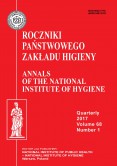Rocz Panstw Zakl Hig 2022, 73(3): 315-323
An evaluation of the knowledge on specific nutritional needs and factors affecting pregnancy outcome in women of reproductive age
[An evaluation of the knowledge on specific nutritional needs and factors affecting pregnancy outcome in women of reproductive age]
ABSTRACT
Background. Pregnancy is one of the few periods in a woman’s life when extra weight is not perceived as a negative factor, but has positive connotations with healthy fetal development, which runs against the modern cult of a perfect, slim and healthy body. Most research studies focus on excessive rather than insufficient weight gain in successive trimesters of pregnancy.
Objective. The aim of this study was to evaluate women’s knowledge about the influence of diet on pregnancy outcome and to assess changes in body weight and eating behaviors during pregnancy.
Materials and methods. The study consisted of an online survey. A total of 325 correctly and completely filled in questionnaires were considered. The respondents were divided into two groups: women without children (44.92%) and pregnant women and mothers (55.08%). The respondents’ knowledge about eating behaviors during pregnancy was compared between the two groups. The responses given by mothers were used to evaluate weight gains during pregnancy and the nutritional status of pregnant women.
Results. Changes in body weight during pregnancy were regarded as acceptable and pregnancy weight gain was considered a normal process by 92% of the respondents. Pregnant women had greater knowledge about the need for increased caloric intake in successive trimesters (p=0.0012). The respondents’ knowledge about maternal health and healthy fetal development was assessed with the use of 10 true or false questions. The average score was 6.3±1.8 points, and no significant differences were found between mothers/pregnant women and women without children (6.6±1.3 vs 6.2±1.7, p>0.05). In the present study, 67% of the respondents were of the opinion that they followed a healthy diet, 14% claimed that they did not eat right, but were not motivated to make any changes.
Conclusions. The respondents were aware that weight gain during pregnancy is a normal physiological process, but 1/3 of the respondents did not feel comfortable with the observed changes. The respondents did not have sufficient knowledge about the influence of maternal weight on fetal development. The use of diuretics and laxatives by pregnant women without medical consultation is a worrying phenomenon. These results indicate that women should have better access to knowledge about the impact of healthy nutrition on pregnancy outcome.
STRESZCZENIE
Wprowadzenie. Ciąża to jeden z nielicznych okresów w życiu kobiety, w których nadwaga nie jest postrzegana jako czynnik negatywny, ale kojarzy się pozytywnie ze zdrowym rozwojem płodu, co sprzeczne jest ze współczesnym kultem idealnego, szczupłego i zdrowego ciała. Większość badań naukowych skupia się na nadmiernym, a nie niedostatecznym przybieraniu na wadze w kolejnych trymestrach ciąży.
Cel. Celem pracy była ocena wiedzy kobiet na temat wpływu diety na przebieg ciąży oraz ocena zmian masy ciała i zachowań żywieniowych w okresie ciąży.
Materiał i metody. Badanie składało się z ankiety internetowej, uwzględniono 325 poprawnie wypełnionych ankiet.
Respondenci zostali podzieleni na dwie grupy: kobiety bezdzietne (44,92%) oraz kobiety w ciąży i matki (55,08%). Porównano wiedzę respondentek na temat zachowań żywieniowych w czasie ciąży między obiema grupami. Odpowiedzi udzielone przez matki zostały wykorzystane do oceny przyrostów masy ciała w czasie ciąży oraz stanu odżywienia kobiet w ciąży.
Wyniki. Zmiany masy ciała w czasie ciąży respondentki uznały za dopuszczalne, a przyrost masy ciała w ciąży zaakceptowało 92% badanych. Kobiety w ciąży miały większą wiedzę na temat potrzeby zwiększenia spożycia kalorii w kolejnych trymestrach (p=0,0012). Wiedza respondentek na temat zdrowia matki i zdrowego rozwoju płodu została oceniona za pomocą 10 pytań. Średni wynik wyniósł 6,3±1,8 punktu i nie stwierdzono istotnych różnic między matkami/kobietami w ciąży a kobietami nieposiadającymi dzieci (6,6±1,3 vs 6,2±1,7, p>0,05). Wśród kobiet w ciąży aż 67% respondentek było zdania, że stosują zdrową dietę, 14% twierdziło, że nie odżywia się prawidłowo, ale nie ma motywacji do wprowadzania zmian.
Wnioski. Respondentki miały świadomość, że przyrost masy ciała w czasie ciąży jest normalnym procesem fizjologicznym, jednak 1/3 badanych nie czuła się komfortowo z obserwowanymi zmianami. Kobiety nie posiadały wystarczającej wiedzy na temat wpływu masy matki na rozwój płodu. Stosowanie leków moczopędnych i przeczyszczających przez kobiety w ciąży bez konsultacji lekarskiej jest niepokojącym zjawiskiem. Istnieje potrzeba zwiększenia dostępności szkoleń z zakresu roli i prawidłowego żywienia kobiet w ciąży.
Downloads: 1285


